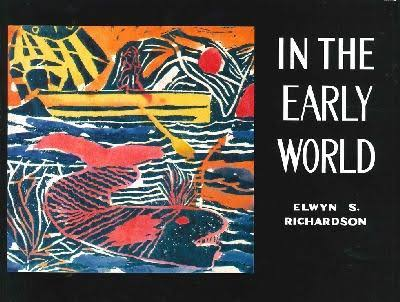I'm angry. Well, maybe not angry. How about cross? Like ... a bit cross? Yeah, I'm just a bit 'cross'.
You see, I've just finished reading Elwyn Richardson's book 'In the early world'.
So, why am I cross? Well, I've been in this education lark since 1979. I trained at the old Christchurch Teachers' College in 1978. And... I HAD ... NEVER ... EVER ... HEARD ... ABOUT ... ELWYN RICHARDSON until just a few years ago. Why the **** not?
Dubbed an educational ‘saboteur’ by poet James K. Baxter, Elwyn Richardson was an educator who helped change the practice of teaching and learning in New Zealand schools in the second half of the twentieth century.1 He is best known for his work at Ōruaiti School in rural Northland, where from 1949 to 1961 he undertook an experiment in progressive education with a particular focus on arts and crafts. His influential and internationally celebrated book In the early world (1964) chronicled the Ōruaiti experiment and provided a road map for future educators.
(Source: https://teara.govt.nz/en/biographies/6r8/richardson-elwyn-stuart last accessed 17 June 2022) .
And there is this delightful film of his mahi:
(Source: https://www.youtube.com/watch?v=7v2IeWIr2A8, last accessed 17 June 2022)
The DNZB says "who helped change the practice of teaching and learning in New Zealand schools in the second half of the twentieth century". I don't think he did. That is not a criticism of him, but of the system. I don't see this around me, in either primary or secondary schools. I have never seen this around me, in either primary or secondary schools.
And then I remembered this link that Dorothy Burt sent me. You'll see that Dorothy also recommends the Richardson short film. I watched it when Dorothy sent it through. Clearly this stuff is not new. Far from it. But we seem to have a short memory for the work, the kaupapa, that harnesses the power of creativity to support engagement and learning.
And when we overlay on top of this the mahi of Prof Peter O'Connor and the CAST team from the University of Auckland, work that is bringing together the evidence of the impact of creativity and the arts on our wellbeing ... gah. I'm still more than a wee bit cross!!!
Richardson's mahi seems to have been massively significant. I need to learn more about how this connects with the late 1950's, 1960's, and 1970's, work of Beeby and Gordon, and the arts advisors in schools. The work of such young artists and educators as Ralph Hotere. Halcyon days? Certainly days when maybe, just maybe, as a society we valued creativity more than we do today.
Our thirst for economic growth has fuelled our nearly 40 year love affair with individualism, with neo-liberalism and the free market. We seem to have forgotten the value, andthe power of community, of collective action, and of creativity. We seem to have become fixated on the need for all education to have some sort of demonstrable economic outcome, something that seems to be separating us from our humanity, and our purpose, as human beings. To use a phrase that friend Bosco Peters would often use in sermons while Chaplain at Christ's College, we need to remember that we are 'human beings', not 'human doings'. This has lead us to think that the only worthwhile pursuits in education are those connected with science, technology, and mathematics. There is absolutely nothing wrong with those things. The problem is that this seems to have spawned the view that nothing else matters.
That's why it's doubly important that as a kura we embrace our collective caring, the strengthening of our relational base with our rangatahi and each other, our celebration of our cultural and individual difference, and our vision to be 'he puna auaha a centre of creative excellence'. It's why our Manaiakalani kaupapa is doubly important with its 'Learn Create Share' pedagogy, a pedagogy from which I take the clear message that creativity underpins everything. We can't change the world, but we can change the world for our learners and ourselves.
Yes, I'm a bit cross.. with myself, and with our system.

Kia ora Robin,
ReplyDeleteThank you for this very timely blog post. It is great to reflect on the "In the Early World" video. I remember it from one of the creativity staff meetings a few years ago. Next year as part of our vision of Innovative, Connected, Empowered learners driving their passion for learning there is a focus on the innovative aspect. Being an innovative ākonga means they are creative and a critical thinker. As you can imagine, I am looking forward to the creative part.
I think we will need to look at Elwyn Richardson's work for our 2023 year and how it could support our Learning Through Play philosophy and creavity for learning.
Nga mihi nui,
Mark
Thank you for reminding me about this again.
Kia ora Mark
DeleteThis mahi has my head 'reeling', and still thinking about how e give voice and legs to this in the secondary space... perhaps more importantly though, we lost something that in my opinion was priceless.. how much more educational innovation lies cast aside in our wake?
But would you have read the book if given to you back when you were training .... can't remember professional reading as a priority then?? One point of view I guess and perhaps there is merit in using the arts more - might be a hard sell for some.
ReplyDeleteAgreed. this is as much a comment on the secondary training of the time. I've had messages via DisruptEd Fb page who as primary practitioners were introduced to this work. However the complete lack of teaching focussed rigour was appalling (as distinct from the academic rigour that is now pursued at the expense of practise based rigour.). The challenge is how to introduce appropriate creative focii into secondary practice. Manaiakalani offers answers.
Delete